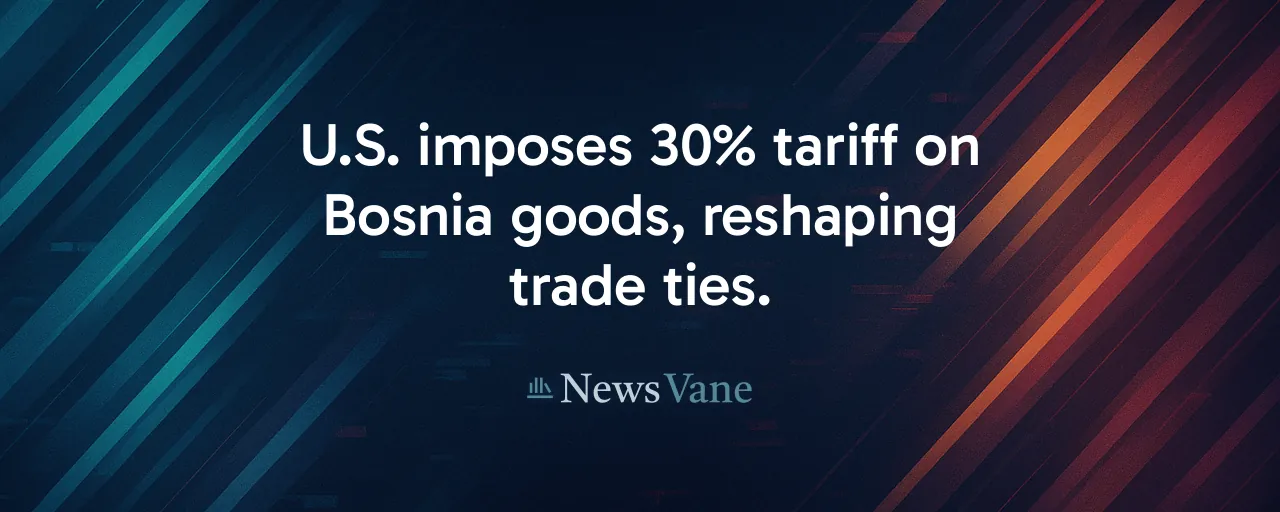A Tariff Ignites Trade Concerns
On July 7, 2025, the White House announced a 30 percent tariff on all goods from Bosnia and Herzegovina, set to begin August 1. This move, replacing an earlier 35 percent duty from April, targets a modest trade flow (under $150 million annually) and signals a broader U.S. push to reshape global trade, raising questions about fairness, economic impact, and diplomatic ties.
Bosnia, a small Balkan nation, exports niche products like silicon metal and ammunition to the U.S. The tariff hikes costs for American importers and threatens Bosnian jobs. While the U.S. aims to protect its economy, the measure risks straining relations with a post-conflict country striving for stability. The measure prompts a closer look at trade policies and their ripple effects.
Why the Tariff Matters
The U.S. imports about $132 million in goods from Bosnia each year, a tiny fraction of its total trade. The tariff adds roughly $40 million in annual costs, hitting Bosnian exporters hard. Defense and metal-processing firms, key to Bosnia's economy, face shrinking U.S. market share. In towns like Tuzla and Goražde, up to 2,000 jobs may be at risk, stirring local unease.
American companies, particularly those relying on Bosnian silicon or specialty tools, now face higher prices. These costs could disrupt niche manufacturing or push firms to seek costlier domestic or EU suppliers. While the tariff aims to bolster U.S. industry, its impact on both nations underscores the complexity of trade barriers.
A Broader Trade Strategy Unfolds
This tariff fits into a larger U.S. plan to address trade deficits and encourage domestic production. Since April 2025, a baseline 10 percent tariff has applied to all imports, with higher rates for nations deemed economic rivals. Bosnia's initial 35 percent rate, now lowered to 30 percent, reflects a nuanced approach and signals firm U.S. intent.
Globally, the move draws scrutiny. The BRICS group has criticized rising trade barriers, while the World Trade Organization may see challenges over fairness rules. Bosnia, eyeing EU membership, needs to balance U.S. relations with European ties, complicating its response to the tariff.
Lessons From the Past
Trade tensions are not new. From 1996 to 2018, Bosnia enjoyed duty-free access to the U.S. under the Generalized System of Preferences. Even during steel tariffs in 2018, Bosnia faced little impact. The current policy shift, rooted in emergency powers, marks a departure from decades of open trade, reflecting a renewed focus on reciprocity.
History shows mixed results for such tariffs. Selective duties can shift supply chains toward allies. Broad measures, however, often raise costs without closing trade gaps. Bosnia's case, with its low trade volume, suggests the tariff's value is primarily political leverage, not primarily economic gain.
Weighing the Human Cost
In Bosnia, industrial workers feel the tariff's sting. Factories in export hubs face cutbacks, threatening livelihoods in a nation still rebuilding from war. Public sentiment may sour toward U.S. policies, pushing Bosnia closer to EU or non-Western partners. Meanwhile, U.S. workers in competing industries may see gains if domestic production ramps up swiftly.
The social stakes highlight a core challenge: trade policies shape lives, not just balance sheets. Both nations must consider how to protect jobs while fostering cooperation, avoiding a cycle of retaliation that could harm vulnerable communities.
Finding Common Ground
Solutions exist to ease tensions. Bosnia could boost purchases of U.S. goods, like energy or agriculture, to offset trade imbalances. Joint efforts on export controls or labor standards could align interests. A bilateral trade group might monitor progress, ensuring mutual benefits and avoiding escalating costs.
The U.S. could offer phased tariff relief tied to Bosnian investments or market openings. Reviving an updated Generalized System of Preferences framework, with clear benchmarks, could rebuild trust. Such steps prioritize dialogue over disruption, preserving economic and diplomatic ties.
A Moment for Reflection
The U.S.-Bosnia tariff dispute, though small in scale, reveals the delicate balance of global trade. Policies aimed at protecting one economy may unsettle another, with real consequences for workers and businesses. Both nations face a choice: they can entrench their positions or collaborate for shared gains.
Reasoned dialogue, grounded in data and mutual respect, offers a path forward. By addressing job security, supply chain needs, and fair trade rules, leaders can turn tension into opportunity. The stakes, while focused on two nations, echo a global need for cooperation.
As trade policies evolve, the world watches. Will the U.S. and Bosnia find balance, or will barriers deepen divides? The answer lies in choices made today, with impacts felt far beyond their borders.
